11 Ways to Use ChatGPT for Marketing Your Small Business – Cập nhật kiến thức mới nhất năm 2024
Netflix took 3.5 years. Facebook took 10 months. Instagram blew us away with 2.5 months.
And then came ChatGPT.
Launched in November 2022, it took just five days for this piece of technology to reach one million users.
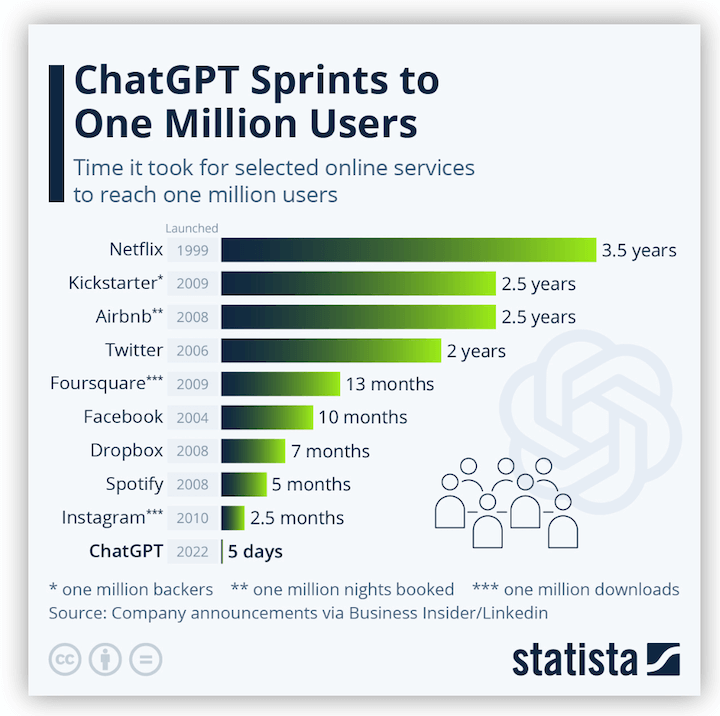
Image source
So yes, its the talk of the town. But with so much information out there on it, you may not be 100% clear on exactly what it’s all about and if it has any implications for you and your small business.
So in true WordStream fashion, I’m going to simplify ChatGPT for you so you can learn:
- What it is and how it works
- 11 practical ways to use it for small business marketing (with prompt examples)
- Tips and limitations to keep in mind
What is ChatGPT?
ChatGPT is a free informational resource (with encyclopedic knowledge, like Google or Wikipedia—but different, which we’ll get to shortly) that comes in the form of an artificial intelligence (AI) chatbot. So while you obtain information from Google by typing a search into a box and getting pages of results, you obtain information from ChatGPT by participating in a dialogue. You ask questions and it spits out answers based on your input.
It’s basically just a really advanced chatbot. According to its creator Open AI, ChatGPT can “answer follow-up questions, admit its mistakes, challenge incorrect premises, and reject inappropriate requests.”
And according to Life Architect, it can do a whole lot more…like pass the bar exam, write bills, and get an MBA.
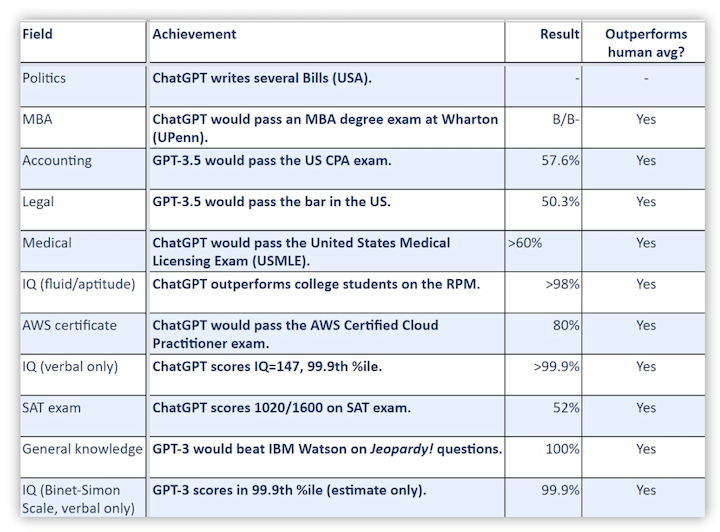
Image source
How does ChatGPT work?
While tools like Google and Siri source information from the web, ChatGPT has its own “brain.” How? As a large language model technology, it amasses large amounts of text data from the internet: books, articles, websites, blog posts, and more.
And the “GPT” stands for generative pre-training transformer, meaning it is trained on these large amounts of text data and uses the GPT-3 algorithm (called a transformer algorithm) to generate text similar to human conversation.
As you can see, with so much data, GPT-3 soars past its predecessors in terms of learning parameter count.
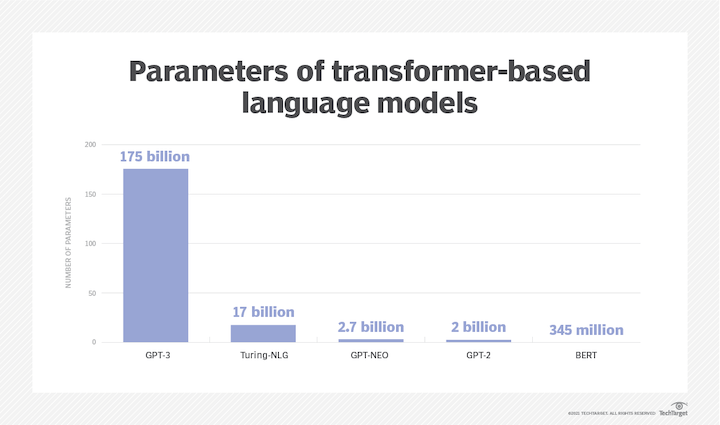
Image source
What is ChatGPT used for?
Since language and communication is used for, well, everything, ChatGPT is also proving to be useful for, well, everything. Some of ChatGPT’s many capabilities include:
- Write code, articles, marketing copy, stories, poems, emails, essays
- Generate ideas and examples, multiple choice questions
- Recommend products, services, movies, a
- Explain complicated topics in layman’s terms
- Analyze: sentiment and tone based on punctuation, words, and phrases
- Translate text in 95 different languages
- Find data sets and job openings
- More: the list is ever-growing
Given the above mere starter list, the implications are pretty overwhelming for any one industry. But of course, the one we’re concerned with is that of digital advertising.
Limitations of ChatGPT
You knew this was coming. ChatGPT is not a replacement for, well, anything: It’s not a marketing consultant, doctor, accountant, lawyer, plumber, etc. While it’s an advanced technology, it’s in its early stages, and like any computer, AI tool, or machine learning technology, it does not come with a 100% guarantee of information accuracy.
It is just a computer that can aggregate and summarize data, but other than what you tell it, it does not have the full context of your life, your business, your health, or your house that it would need to provide 100% reliable and fully relevant answers.
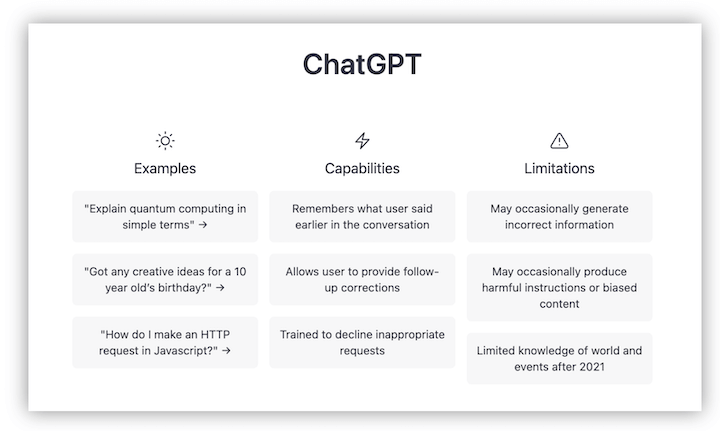
The tool itself says it:
- May occasionally generate incorrect information
- May occasionally produce harmful instructions or biased content
- Limited knowledge of world and events after 2021
That being said, it’s important to be as specific as possible with your prompts and then use the responses as starting points only—to iterate on, look into deeper, and explore further.
You’ll even notice that when ChatGPT gives you answers. It will say things like “While X tool is a helpful resource for Y, it’s important to note that it’s just one of many tools” and so on and so forth.
12 ways to use ChatGPT for marketing
The use of AI in marketing—even for small businesses—is nothing new. If you’ve ever run a dynamic search ad campaign in Google Ads, asked a question via Google Analytics Intelligence, or used an AI content generator to write marketing copy, then you’ve experienced it yourself!
But because ChatGPT is somewhat unprecedented in many of its capabilities, it has more applications for marketing than ever before, and the list is growing.
Let’s review some of the easiest ways to use ChatGPT for marketing:
1. Ask for marketing strategy recommendations
Looking for the best ways to promote your business? Ask ChatGPT for advice. The more specific, the better. For example, rather than asking about the best marketing strategies, ask about the best marketing strategies for local businesses.
Prompt: What are the best marketing strategies for local businesses?
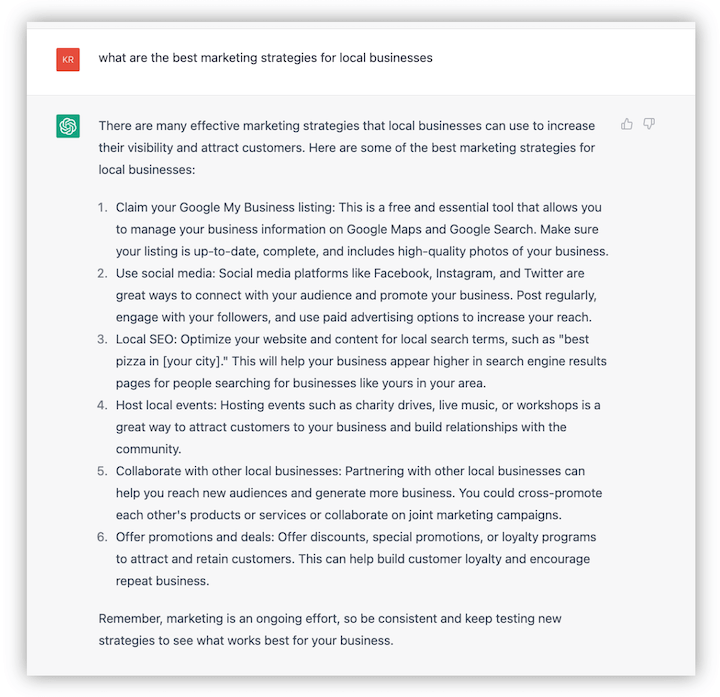
Even more specific…
Prompt: What are the best marketing strategies for local dentists?
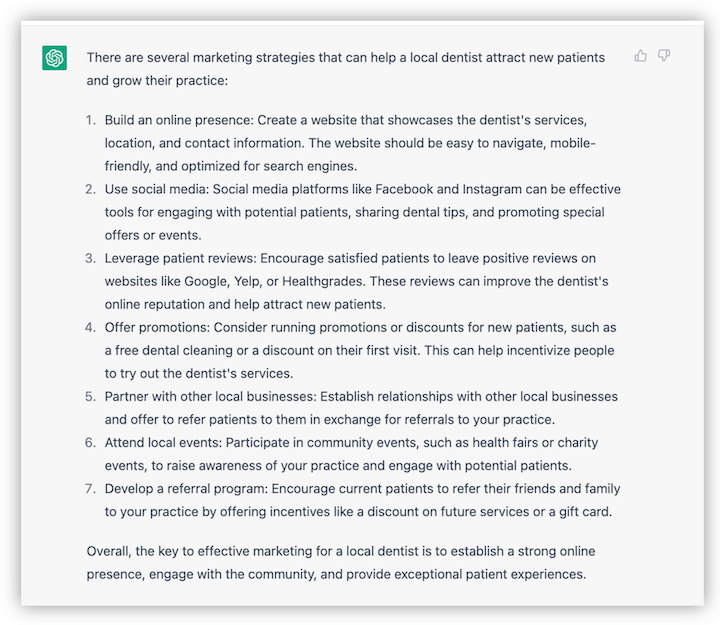
Side note, if you want to do tip #1, use our dentist website examples for inspo!
2. Get marketing tool recommendations
Yes, ChatGPT is a tool in and of itself. You can even use it to do keyword research.
Prompt: Do keyword research for me for custom framing.
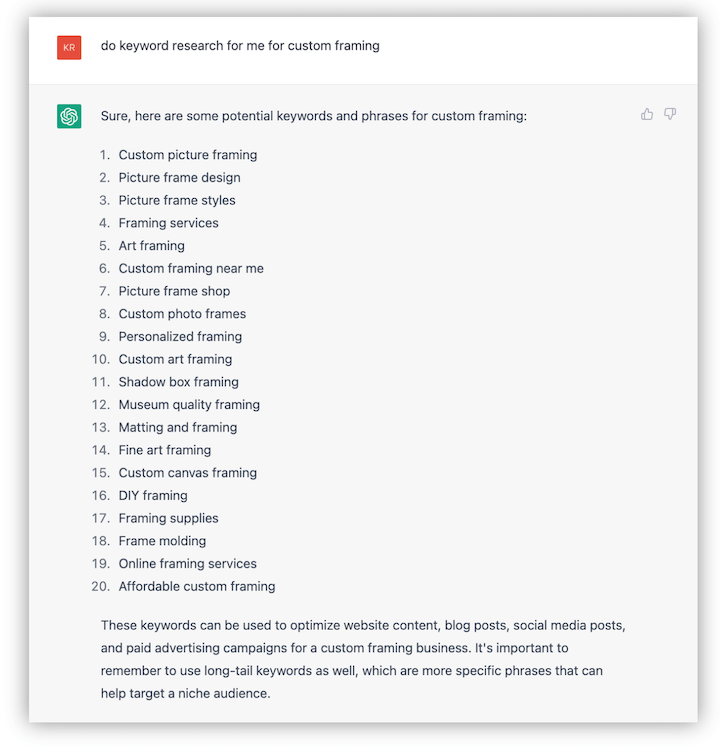
Prompt: Can you give me search volume, competition level, and cost per click for each of those keywords
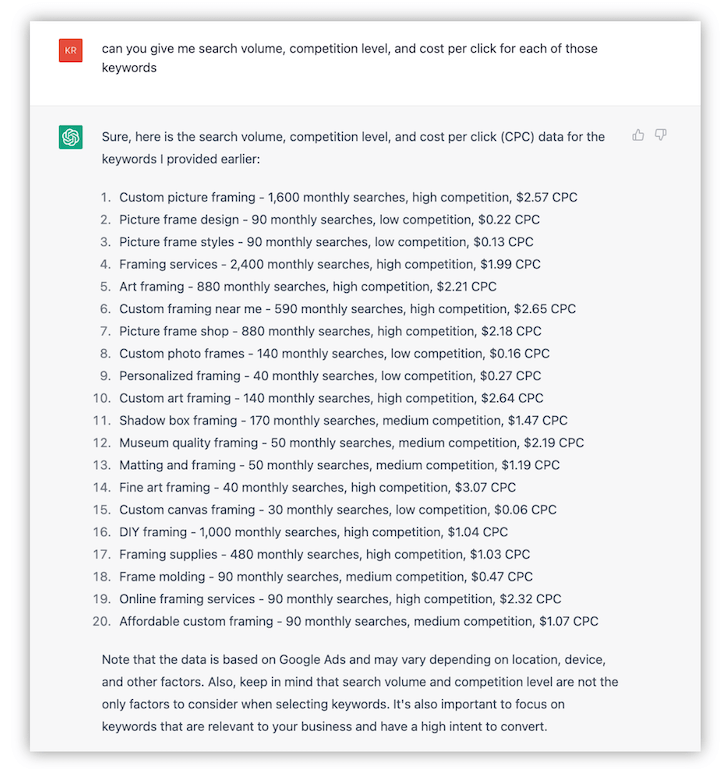
But you can also use it to get recommendations for tools. After all, there’s a vast sea of “top ten” lists for just about any tool out there on the web. For example, ask about the best keyword research tools.
The answer spits out a similar list to our roundup of the best free keyword research tools:
Prompt: What are the best free keyword research tools for small businesses?
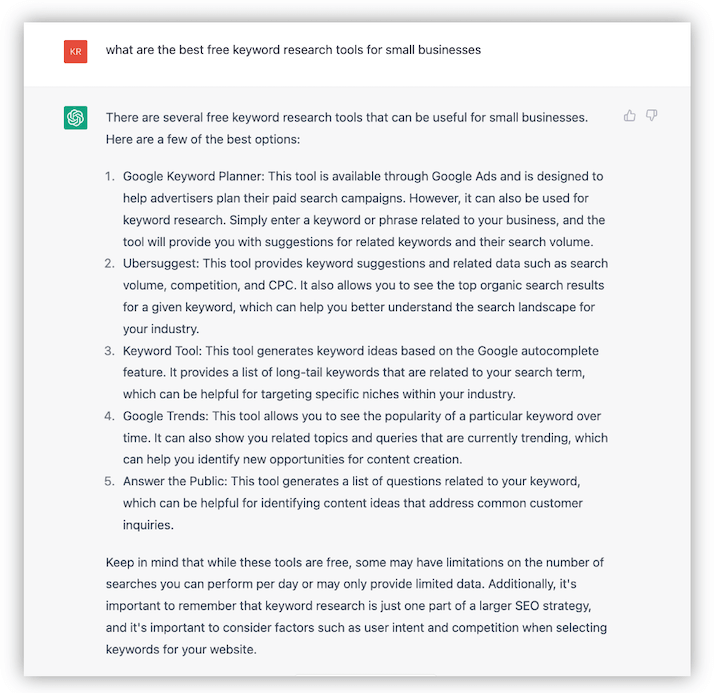
Except it’s missing one tool: Our Free Keyword Tool! As an aside, I did ask it to tell me about our Free Keyword Tool:
Prompt: Tell me about WordStream’s Free Keyword Tool
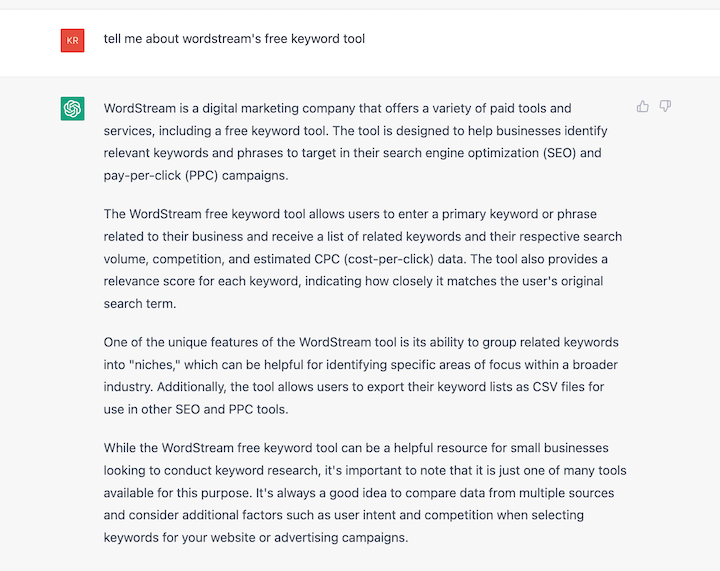
Not bad. Lots of accurate statements in there, like how it “allows users to enter a primary keyword or phrase related to their business and receive a list of related keywords and their respective search volume, competition, and estimated CPC data.” But there are some outdated features mentioned in there as well.
3. Generate copy for your marketing assets
You can use ChatGPT to help you with creating copy for any of your marketing collateral: Emails, blog posts, product descriptions, ad copy, headlines, website copy, social media captions, and more. Ask it to:
- Generate the content
- Modify existing content for a particular tone—like to make it more exiting for a particular persona, or to make it more negatively charged.
- Improve existing content for a goal (SEO, for example).
Of course, an entire blog post is a bit of a stretch. You may instead want to ask for an outline.
Prompt: Write a promotional email for 50% off custom framing for the month of October.
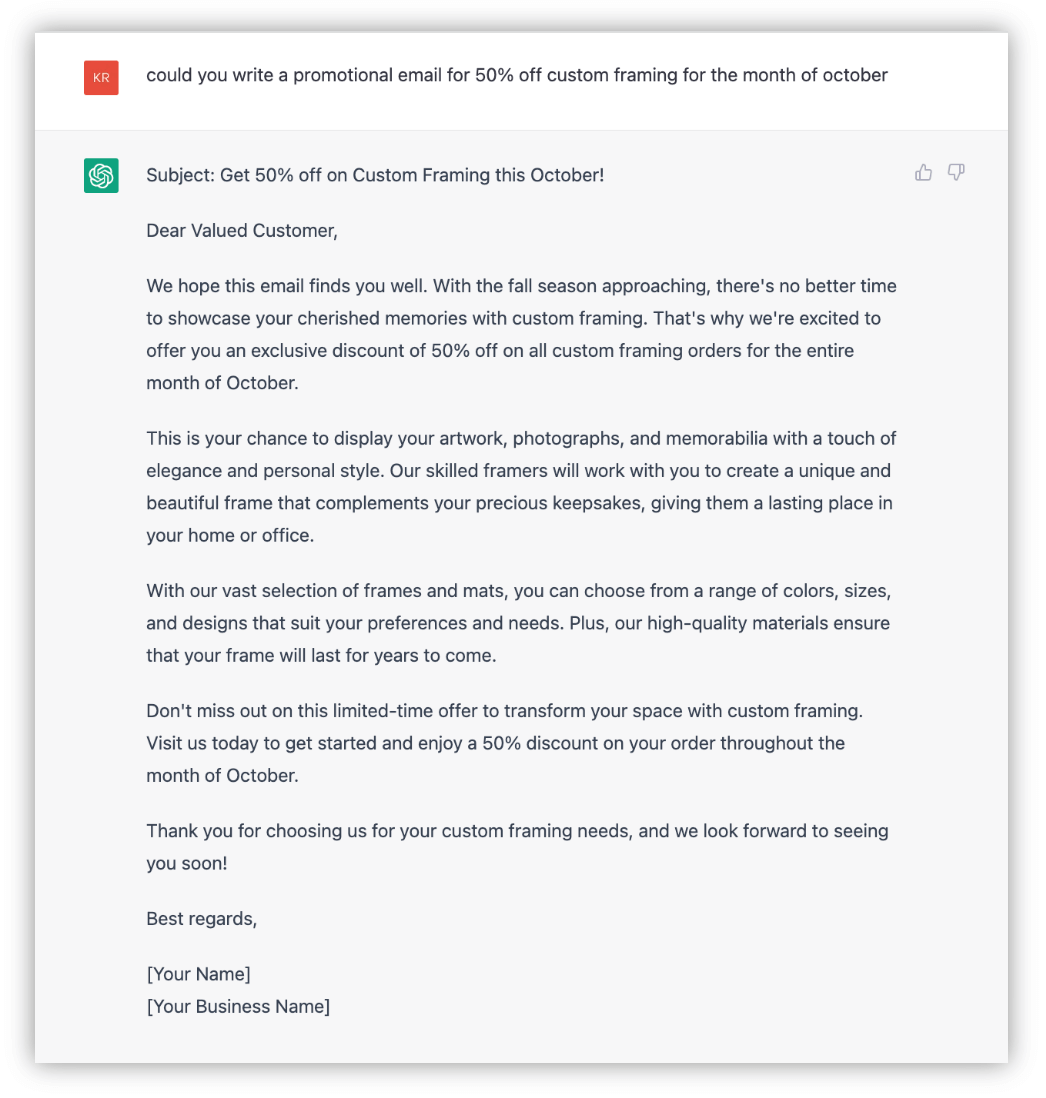
Here’s a good example of using the output as a starting point only. This is far too much text for a promotional email.
Given the ol’ disclaimer I mentioned above, here are some additional (and call me biased, but reliable) resources we have to help you with generating great marketing copy:
4. Campaign structure
In her post on how to use ChatGPT for Google Ads, Claire Jarrett notes that asking the tool to plan out an entire Google Ads campaign has its hiccups, but one thing it did get right was ad group organization. I tried out a similar prompt and found it to be pretty useful.
Prompt: What ad groups should I create for a Google Ads campaign for a chiropractor?
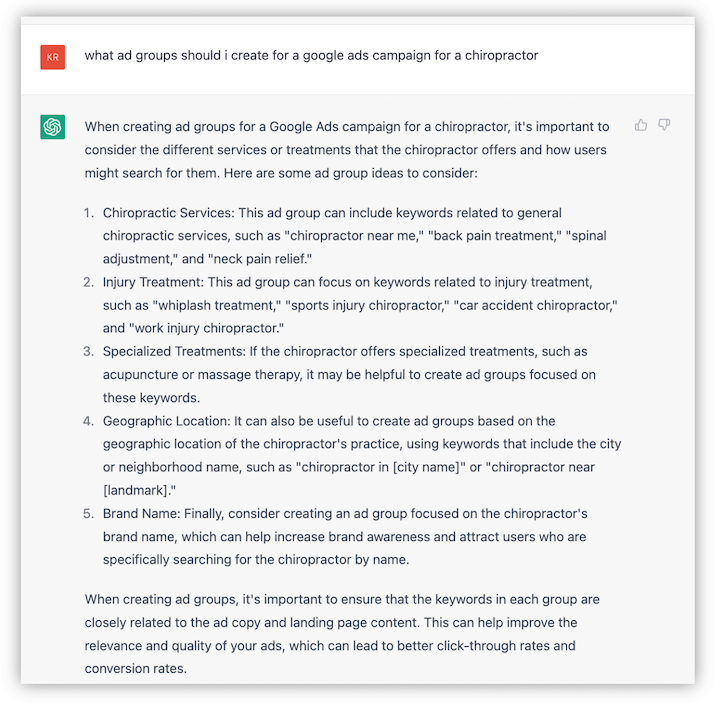
5. Create lead magnets
Another application Claire covers is the creation of lead magnets—free tools in particular. For example, you can ask ChatGPT to generate Javascript code for an ROI calculator.
Prompt:
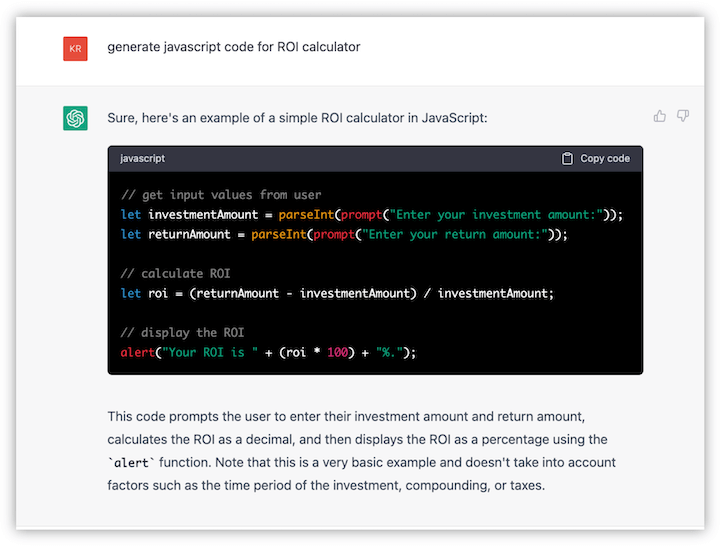
Prompt: How do I implement this on my website?
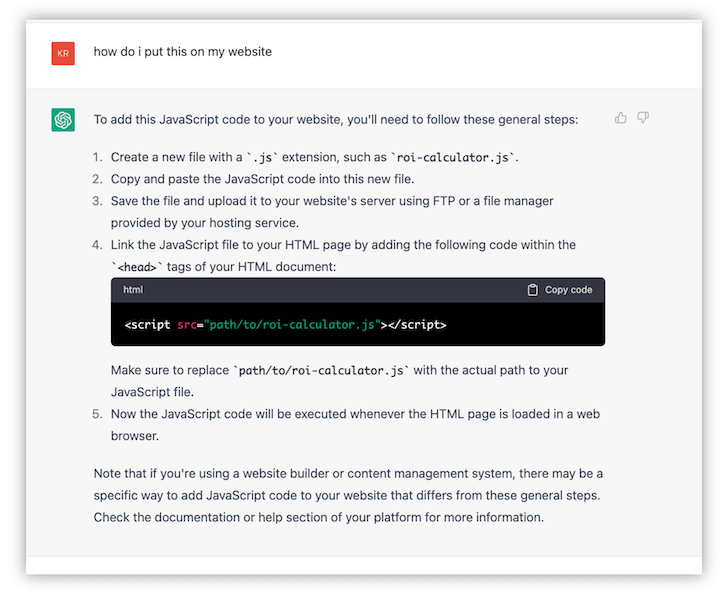
6. Content ideation
There are several ways to use ChatGPT to get ideas for your blog posts, guides, whitepapers, and ebooks. You can ask it for post ideas based on topics or existing content, use it to perform research on a topic, curate the top articles on a topic, or have it simplify a complex concept for you so you can simplify it for your readers.
Prompt: Explain how the Google Ads auction works
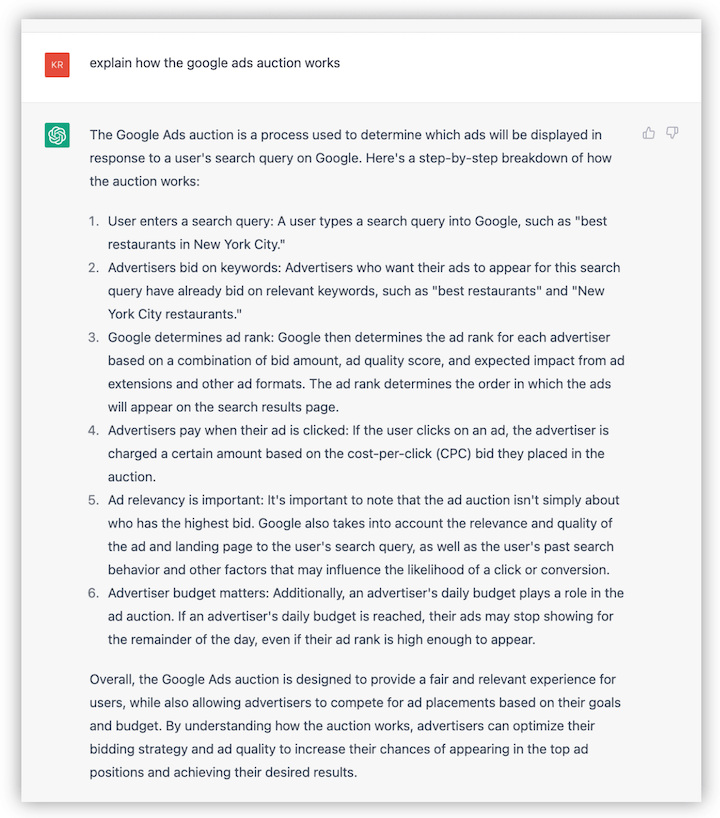
Based on our post on how the Google Ads auction works, you can see this isn’t too shabby!
7. Reporting & analytics
Because GPT can analyze data, you can use it to identify trends, patterns, and insights in your data to make data-driven decisions. You can also use it to help identify what metrics to measure for your KPIs in the first place, and what to set for goals. And you can find out formulas, regular expressions, spreadsheet shortcuts, and more.
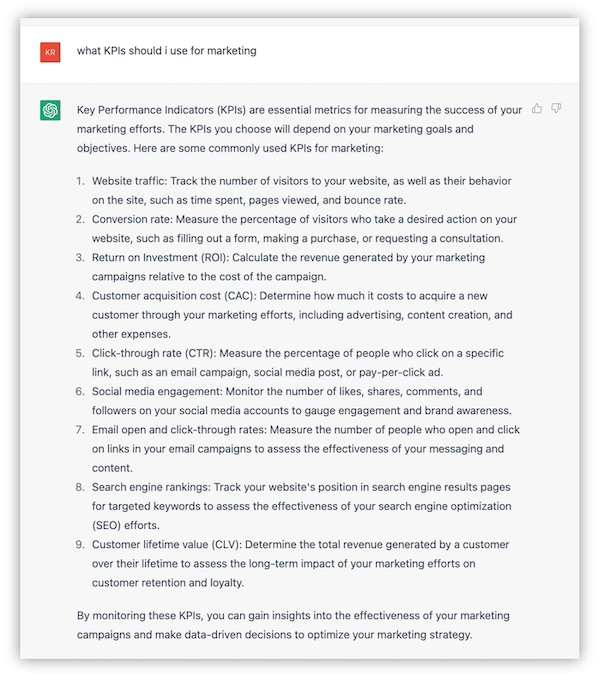
Note that this feature is still pretty rudimentary. You should absolutely still be using tools like Google Data Studio (now Looker Studio), Google Analytics and Google Ads for your organic traffic and PPC reporting.
Note that Google Ads has its own AI features like the Insights and Recommendations tools, both of which should also be taken with a grain of salt!
8. Market research
Your target audience is, well, a moving target. You’re never fully finished with identifying who they are! Use ChatGPT to learn about segments and personas within your target audience, or ask it to generate a survey or poll for you that you can send out to gather intel. Or give it some audience data to interpret.
Prompt: Create a poll for me to find my target audience.

9. Build out your own chatbot
Adding chat to your website is a great way to generate leads, engage customers, and gather feedback. Use Chat GPT to get ideas for prompts and answers for your own!
Prompt: I’m building a chatbot for my website. How should I greet customers who come to my pricing page?
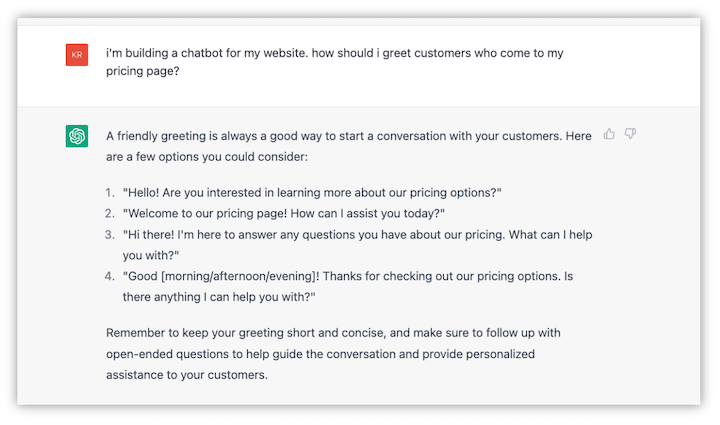
You can also use our chatbot examples to get ideas.
10. Run a competitor analysis
A SWOT analysis examines the strengths, weaknesses, opportunities, and threats of a competitor with respect to your business. Use it to learn about your competitors—and don’t forget to request a SWOT analysis on your own business. It could be a good way of understanding what kind of information is out there about your business!
Prompt: Run a swot analysis on hasbro
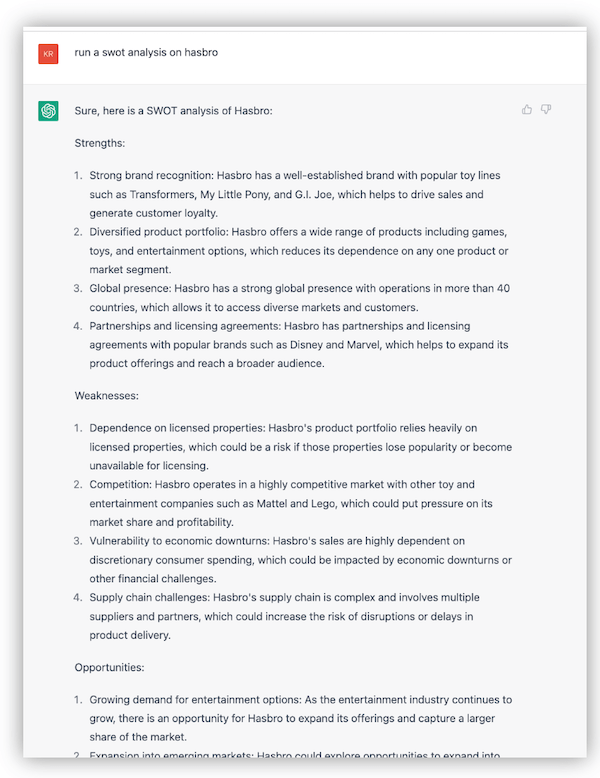
Note that we have a SWOT analysis template you can use!
11. Learn new skills
Maybe, you don’t know enough about SEO to know what to ask ChatGPT. No problem, ChatGPT can help you learn SEO or any other skill! Ask it to tell you about the topic, for the best resources available on the topic, for a quiz on the topic, and more.
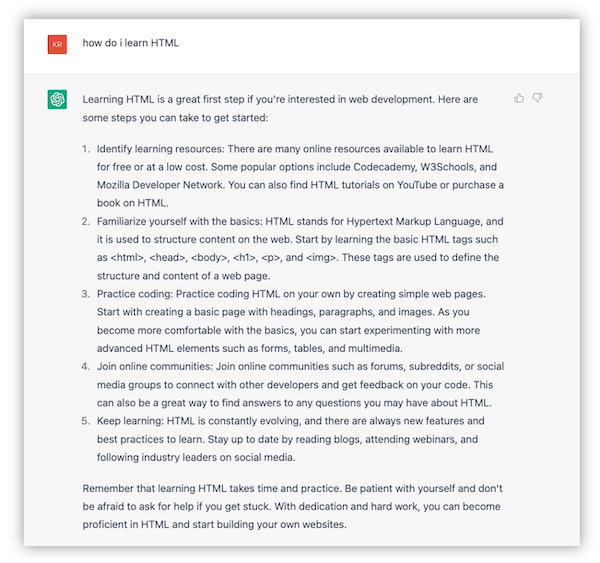
And you know the drill by now. We also have plenty of resources to help you learn new skills.
There are several more applications from the broader small business standpoint, such as with sales workflows, customer service, customer retention, and automating parts of workflows.
Try using ChatGPT for marketing
Remember, while it’s a source of information with a fun interface, ChatGPT is still in its early stages and has its drawbacks, limitations, and risks. There will be integrations, ads, information accuracy, privacy, and more to reckon with. All that being said, if you try using ChatGPT for marketing using any of the methods covered in this post, take the responses with a grain of salt and when inputting prompts, be cautious of your and your customers’ privacy.
Here are the methods we covered:
- Ask for marketing strategy recommendations
- Request marketing tool roundups
- Generate copy for your marketing assets
- Structure out your Google Ads campaigns
- Create lead magnets
- Brainstorm and research content topics
- Improve your reporting and better analyze data
- Perform market research
- Build out your own chatbot
- Run a aompetitor analysis
- Learn new skills
Kết thúc
Ngoài các bài viết tin tức, bài báo hàng ngày của SEMTEK, nguồn nội dung cũng bao gồm các bài viết từ các cộng tác viên chuyên gia đầu ngành về chuỗi kiến thức Kinh doanh, chiến lược tiếp thị, kiến thức quản trị doanh nghiệp và kiến thức quản lý, phát triển tổ chức doanh nghiệp,.. được chia sẽ chủ yếu từ nhiều khía cạnh liên quan chuỗi kiến thức này.
Bạn có thể dành thời gian để xem thêm các chuyên mục nội dung chính với các bài viết tư vấn, chia sẻ mới nhất, các tin tức gần đây từ chuyên gia và đối tác của Chúng tôi. Cuối cùng, với các kiến thức chia sẻ của bài viết, hy vọng góp phần nào kiến thức hỗ trợ cho độc giả tốt hơn trong hoạt động nghề nghiệp cá nhân!
* Ý kiến được trình bày trong bài viết này là của tác giả khách mời và không nhất thiết phải là SEMTEK. Nhân viên tác giả, cộng tác viên biên tập sẽ được liệt kê bên cuối bài viết.
Trân trọng,
Các chuyên mục nội dung liên quan
- Bản tin số mới nhất | Góc chia sẻ kiến thức số hóa & Chiến lược kinh doanh
- Trang chủ
- Marketing tổng thể
- SEO
- Thiết kế Website
- Web Hosting
- VPS



